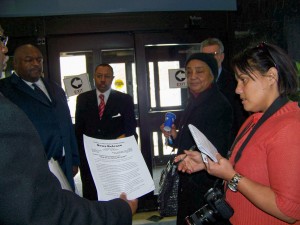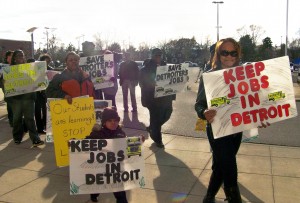
AFSCME Co. 25's Ed McNeil (center) talks with Detroit News reporter Jennifer Chambers (l) after dozens of union and community representatives flooded the lobby of the newspaper's HQ Feb. 7, to protest DPS layoffs and privatization; Local 345 President Keith January at McNeil's right, OEIU Local 324 rep. Dan Ringo at his left; Helen Moore of Keep the Vote No Takeover at far right
700 workers laid off, reapplying with human rights violator Sodexo
DETROIT – When big media wouldn’t come to hear Detroit Public School union leaders, ministers, and community groups protest DPS czar Robert Bobb’s decision to outsource 700 jobs to the mammoth French-based Sodexo corporation at a press conference Feb. 7, they went to big media.
“I have been calling the governor’s office every day to demand an immediate moratorium on outsourcing and school closings,” Keith January, President of AFSCME Local 345, told Detroit News reporter Jennifer Chambers, who finally came down after dozens crowded into the Detroit Media Partnership headquarters lobby to demand coverage. “Our custodians make $11.45 an hour already—how can the district save any money by replacing them? Our people are down at the Welcome Center right now re-applying for jobs they’ve had for 25 and 30 years.”

Channel 4 denies access to prominent union and community leaders, including (l to r) Marian Kramer of Michigan Welfare Rights, Helen Moore of KTVNT, Rev. Charles Williams II, Saundra Williams, president of Metro Detroit AFL-CIO (in rear with hooded jacket) and AFSCME Local 345 Pres. Keith January at far right
January said he represents 70 percent of the workers affected by Bobb’s outsourcing move, aimed at custodial, building repair, maintenance, engineering and grounds services workers. The district said in a Jan. 27 release that the $43.9 million five-year contract with Sodexo involving seven subcontractors, which is to take effect Feb. 21, would save $75 million over five years, while the unions contended proposals they put on the table would save $92 million.
Bobb said in the release, “This is about reinventing Detroit Public Schools and redirecting resources to the classroom. At the end of the day, we have to ask ourselves, ‘What is our core mission?’ Is our core mission cleaning schools?’ We need clean and well-kept facilities. However, our core mission is educating students.”
The district said 45 percent of the work was to be done by “seven local businesses, five of which are Detroit-headquartered and minority owned.” The release specified that the Sodexo contract would give “priority” to all current DPS workers, with all vacancies being filled by Detroit residents first at DPS wage scales, with 90 percent of health care premiums paid by the employer. Instead of the current DPS pension plan, administered under the Michigan Employee Retirement System (MERS), the employer would establish a 401k plan.
“When we met with Sodexo, they told us no contract has even been signed and no subcontractors have been hired,” said Dan Ringo, of Operating Engineers International Union (OEIU) Local 324. Other unions have requested the contract through the Freedom of Information Act, with no success.
During the confrontation at the Detroit Media Partnership, and earlier at Channel Four headquarters, where they were denied access to the premises, union representatives reported that DPS workers re-applying for their jobs with Sodexo at the Welcome Center were calling them to say that Sodexo is requiring them to undergo credit checks and sign releases for information from their personnel records. They said they were not being allowed union representation as they interview for their jobs, to protect them from discrimination and violations of their contract rights.

AFSCME Co. 25's Ed McNeil, and pastors Ed Rowe and Bill Wylie-Kellerman, are denied entrance to Channel 4 HQ Feb. 7, 2011
Sodexo settled a racial discrimination lawsuit against it brought by Black workers for $80 million in 2005. It has been the subject of least nine boycotts nationally over the past 10 years.
VOD contacted press representatives for Bobb and Sodexo to ask about the discrepancies, but had received no response before publication time.
Sodexo says it is the 21st largest employer world-wide, with 380,000 employees at 34,000 sites, and 50 million consumers served daily in 80 countries. In 2009, it reported revenues of 15.3 billion euros, or $20.7 billion.

Marian Kramer of Michigan Welfare Rights, Helen Moore of Keep the Vote No Takeover, and other community and union leaders were denied entrance to Ch. 4 HQ Feb. 7 2011
Sodexo provides food service at the Detroit Institute of Arts, which was privatized during the Dennis Archer administration. Mayor Dave Bing joined Sodexo during its announcement at the DIA last August of a $20,000 grant to feed Detroit schoolchildren during the summer.
Ironically, Sodexo paid $20 million last October to settle a lawsuit brought against it by the State of New York, which charged it with school meal rebate fraud.
“This company cut sweetheart deals with suppliers and then denied taxpayer-supported schools the benefits,” New York Attorney General Andrew Cuomo said in a statement. According to Cuomo, over a five-year period beginning in 2004, Sodexo “received significant rebates from its suppliers without acknowledging or passing the savings on to these schools — in violation of the contracts [between Sodexo and the schools] as well as state and federal laws.” (See article from GRIST below.)
DPS employees charged Aramark with an identical scheme in 2008. That company ran DPS food services from 2001 until the end of 2008.
According to an internal report discovered by Operating Engineers Local 547, Aramark pocketed over $1.1 million from “National Volume Discounts” or rebates from Aramark suppliers. A 2004 audit by Plante & Moran also noted that Aramark did not comply with federal requirements to perform a competitive bidding process when purchasing food items.
“It appears that Aramark may not be returning these cost rebates from favored suppliers to DPS,” said OEIU attorney Doyle O’Connor at the time. “All reading of federal regulations related to school lunches indicates that any such rebates should go for the benefit of the schools and the children.”
O’Connor called Aramark’s profit margin of 46 percent “obscene.
During the Feb. 7 press conference, held at the Michigan AFSCME Council 25 hall across the street from Channel 4 and the Detroit Media Partnership offices, union leaders said the district has produced no documentation showing how it would achieve even the $75 million in savings it claims the Sodexo deal will produce. Additionally, the district has not revealed what profit margin Sodexo will reap.
Sodexo has been the target of a concerted campaign by the Service Employees International Union, which says it thwarts union organizing attempts across the U.S., and pays its workers below poverty-level wages in order to make the profits it does.
Go to:
http://www.youtube.com/watch?v=-vy2evhUc3M&feature=player_profilepage
for video on strike against Sodexo at Tulane University in Louisiana.
Human Rights Watch cited Sodexo in Sept., 2010 in a report, “A Strange Case: Violations of Workers’ Freedom of Association in the United States by European Multinational Corporations.” (Read entire report at Sodexo Human Rights Watch report A Strange Case.)

State Sen. Coleman Young II, who sits on the Senate Education Committee, said at press conference that he thinks Emergency Financial Managers need to be eliminated completely, Keith January at left, School Board Pres. Anthony Adams at right Feb. 7, 2011
“Despite claims of adherence to international standards on workers’ freedom of association,” Human Rights Watch reported, “Sodexo has launched aggressive campaigns against some of its US employees’ efforts to form unions and bargain collectively. Sodexo managers have used many of the tactics . . . . that, while legal under US law, violate international standards . . . .
“These have included: holding captive audience meetings in which workers must sit through managers’ diatribes against trade unions without being able to hear from union representatives in the workplace at any time, including during breaks or lunch periods; requiring front-line supervisors to carry management’s anti-union message into one-on-one conversations with employees; and threatening workers that they can be permanently replaced if they exercise the right to strike for improved wages and conditions.”
The report also cited specific Sodexho union-busting campaigns that did violate U.S. law, by using tactics like firing union organizers, in Phoenix, Arizona, West Orange, New Jersey, and Easton, Pennsylvania.
“What good has outsourcing done in all the years the District has been privatizing, since 1999?” asked Ed McNeil, assistant to the President of Michigan AFSCME Council 25. “There has been nothing but red ink and more red ink in the district’s budgets.”
McNeil pointed out that the district has even ignored the recommendations of a costly report commissioned in 2005 by a transition team appointed by former Governor Jennifer Granholm. (Read report at Diagnotic Financial Assessment of DPS).
That report, authored by the Florida-based MGT of America, made 31 recommendations. Among them was a call for a reduction in the numbers of DPS administrators, which it said far exceeded those of comparable districts, and reviews of the sale of the DPS headquarters on Woodward and the leasing of office spaces in the Fisher Building and elsewhere.
Additionally, MGT called for review of over-expenditures for contracted food services, and an independent review of other services being outsourced “to determine if each of these contracts is still in the best financial and operational interests of Detroit Public Schools.”
The review never happened, and outsourcing continued to grow through every administration. Prior to the announcement of the latest lay-offs, Bobb privatized 400 transportation jobs and laid off service guards as well.
Additionally, Bobb has hired numerous high-paid consultants at will, with no report on their salaries or other matters. (See VOD http://voiceofdetroit.net/?p=3911, which reported that Bobb now has seven additional Assistant Superintendents and other top-ranking jobs on the books.)
Russ Bellant asked why Bobb has not yet complied with Public Act 181 of 2009, which requires full financial disclosure by Emergency Financial Managers such as Bobb.
The Act reads as follows:
“Sec. 21a. (1) An emergency financial manager appointed under this article shall file with the governor, the senate majority leader, and the speaker of the house of representatives and post on the internet on the website of the local unit of government a report that contains all of the following:

Mark Gaffney, president of State AFL-CIO, spoke at DPS unions press conference which big media boycotted Feb. 7, 2011
(a) A description of each expenditure made, approved, or disapproved during the reporting period that has a cumulative value of $10,000.00 or more and the source of the funds.
(b) A list of each contract that the emergency financial manager awarded or approved with a cumulative value of $10,000.00 or more, the purpose of the contract, and the identity of the contractor.
(c) A description of each loan sought, approved, or disapproved during the reporting period that has a cumulative value of $10,000.00 or more and the proposed use of the funds.
(d) A description of any new position created or any vacancy in a permanent position filled by the appointing authority.
(e) A description of any position that has been eliminated or from which an employee has been laid off.
(2) The report required under this section shall be submitted every 6 months, beginning 6 months after the starting date of the emergency financial manager.”

Russ Bellant (l) and Helen Moore strategize on way to Lansing to protest bus attendant lay-offs in Jan. 2011
Bellant said Bobb should have filed the district’s first six-month report in July of 2010, but has not filed that or any subsequently due reports. There are currently no such reports on the district’s website, despite Bobb’s claims of transparency.
Bobb was expected to make a “presentation” to a joint meeting of the Michigan State House and Senate Education committees on Wed. Feb. 9 at 8:30 a.m. in Lansing. Bellant, Helen Moore of Keep the Vote No Takeover, and Al Garrett, President of Michigan AFSCME Council 25, said they are organizing people to go to the meeting to make their own presentations.
“Bobb is trying to get the state law for the Emergency Financial Manager changed before Feb. 11, when Judge Wendy Baxter will hold another hearing on the school board’s lawsuit,” Moore said. The lawsuit demanded that academic control of the district be returned to Bobb, and Baxter essentially ruled in the board’s favor. However, the board recently approved an altered settlement agreement with Bobb, which some in the community said does not go as far as Baxter’s ruling.
Community organizers said in an email, “Our task is to educate all legislators willing to listen on Bobb’s failure as an academic policy maker, convey the harm to students and staff. It is essential that concerned Detroiters show in numbers that indicate the depth of our concerns about Bobb and opposition to any action that expands his power. Car pools will be organized. Please call 368-2148 if you can go, so that we can plan in a timely manner. Please state your phone number twice if you get a voice mail.” (See article above.)
Union leaders said during the press conference that Andy Dillon, formerly Speaker of the House as a Democratic representative, has been going around the state training potential emergency financial managers for the 40 other districts who are in deficit in addition to the Detroit Public Schools. Dillon, who lost his race for the Democratic nomination for governor, is now working for Republican Governor Rick Snyder.
Sodexo to pay New York $20 million for school-meal rebate fraud
by Ed Bruske GRIST Oct. 2010
Sodexo, one of the world’s largest food service companies, has agreed to pay New York $20 million to settle complaints that it fraudulently pocketed rebates from food manufacturers that it was supposed to turn over to some 21 public school districts and the State University of New York, New York Attorney General Andrew M. Cuomo announced today.
“This company cut sweetheart deals with suppliers and then denied taxpayer-supported schools the benefits,” Cuomo said in a statement. An investigation revealed that over a five-year period beginning in 2004, Sodexo “received significant rebates from its suppliers without acknowledging or passing the savings on to these schools — in violation of the contracts [between Sodexo and the schools] as well as state and federal laws.”
New York’s investigation was sparked by two former Sodexo employees, brothers John and Jay Carciero, who were general managers for the company in Massachussetts and were “outraged when they discovered Sodexo’s practice of pressuring food and beverage vendors to kick back huge rebates and then secretly pocketing the savings rather than passing them on to government clients as required by their contracts,” according to a statement released by the Carcieros’ attorney. The clients included hospitals, universities, schools, and nursing homes.
John Carciero complained he was fired after he complained internally about Sodexo’s rebate practices. Jay Carciero said he was demoted and later fired for the same reason. The brothers filed a whistleblower lawsuit against Sodexo under the federal False Claims Act in Massachusetts, and later added claims under similar state laws in New York.
The settlement was described as the largest ever under New York’s false claims statute that did not involve Medicaid.
Jay Carciero has since died. John Carciero yesterday issued a statement, saying, “My brother, Jay, and I were angry when we learned that Sodexo, a multi-billion dollar company, was ripping off school lunch programs and other government food services. The million of dollars from the rebates should have gone back to schools and other government clients. Sodexo betrayed the trust of the clients it was supposed to serve and hurt taxpayers at the same time.”
Under New York state law, the Carcieros as whistleblowers are entitled to $3.6 million of the $20 million. The rest will be divided among the school districts involved.
Manufacturers commonly give rebates for purchases from large food service companies such as Sodexo, Chartwells, and Aramark, as I detailed in this previous post. Under federal law, contractors are supposed to credit those rebates as part of their invoices, so that federal agencies are paying only “net costs.” Under U.S. Department of Agriculture rules governing the federally-subsidized school lunch program, school contracts with food service providers must explicitly state that all rebates will be credited to the schools. But it has been widely assumed in school-food circles that the big food service vendors were not returning all of the rebates they receive.
The investigation in New York “has revealed that it is common practice within the food service industry for service providers like Sodexo to leverage their size and market dominance to obtain these rebates from vendors that supply food products, equipment, and supplies,” said Cuomo. Those rebates typically amounted to about 14 percent of Sodexo’s purchases from suppliers, according to the New York attorney general’s office. Cuomo said his investigation “continues to examine the rebating practices of other large, multi-national corporate providers of food service and facilities management.”
A report I recently published based on documents obtained under the Freedom of Information Act showed that D.C. Public Schools had received more than $1 million in rebates from Chartwells, its contracted food service provider, since Chartwells took over the job two years ago. The rebates help explain why children in D.C. schools are often served brand-name products of dubious nutritional value. But the rebates Chartwells declared on its invoices totaled only 5 percent of purchases, a rate some observers say is low — and certainly far less than the 14 percent cited by Cuomo in the Sodexo case.
D.C. school officials said they requested an itemized accounting from Chartwells last October of where the rebates it claimed had come from, but had only recently received it. They have not made it public.
An attorney for the Carcieros in Washington, D.C., Colette G. Matzzie, said in a statement, “New York is not the only state where Sodexo operates school cafeterias and accepts rebates from vendors. With so many state and local governments short on funds, we hope that other governments will look to what New York has done for its citizens and make sure that Sodexo and other food vendors pass along savings to those who are paying the bills.”










